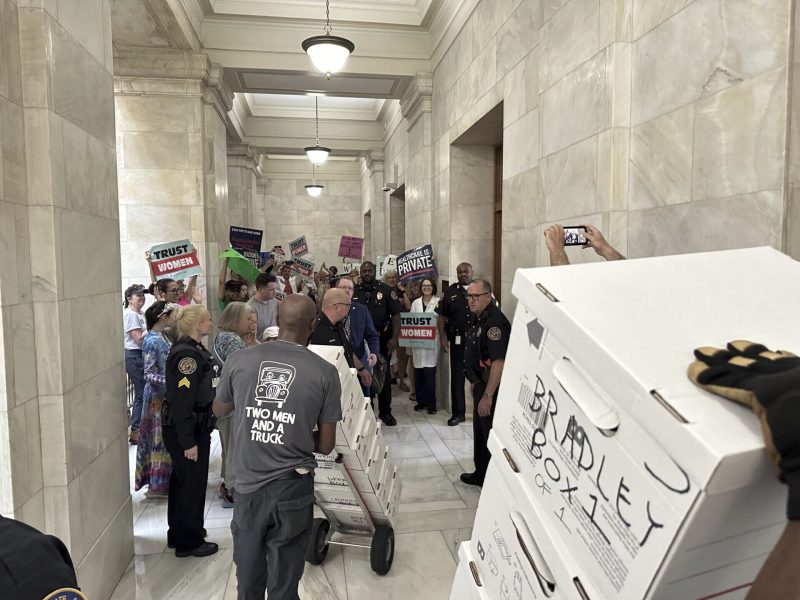
GOP officials aren’t too interested in letting states decide on abortion
Former president Donald Trump certainly recognizes that he’s in a tricky position on abortion. Running for president in 2016 and seeking to bolster his support among religious conservatives, he promised to nominate justices to the Supreme Court who would vote to overturn Roe v. Wade’s protection of access to abortion. He did; they did. And now he’s running for president again, part of his record being that he’s the guy who upended the ability of women to have access to the procedure.
Trump has tried to spin this legacy as a demonstration of his ability to get things done.
“What we’re doing is bringing it back to the states where everybody wanted it,” he said during an interview at the National Association of Black Journalists convention this summer. “Democrats, Republicans, liberals, conservatives, everybody wanted abortion brought back. They didn’t want Roe v. Wade in the federal government. They wanted it — everybody wanted it back.”
This is untrue for various reasons, particularly that Democrats and liberals were not asking that legal protections for abortion access be reversed. But it’s where Trump has landed: a 10th Amendment, states’-rights rationale for what he did while serving as president.
If there’s one thing that American history demonstrates, though, it’s that a lack of federal protections allows states to finagle the rules, should they want to, to achieve the outcome they’re looking for. “Letting states decide” theoretically means letting state residents decide, but generally, instead, means letting elected representatives decide. And that often means having partisan actors use the rules to secure or protect their own power.
What has “let the states decide” on abortion looked like in practice?
It has meant that Republicans on Michigan’s Board of State Canvassers blocked ballot access for a constitutional amendment protecting access to abortion two years ago because some presentations of the ballot language lacked clear spaces between the words. The state Supreme Court ultimately allowed the amendment to be put before voters.
It has meant an effort by Ohio’s Republican secretary of state to present loaded language to voters considering an amendment protecting abortion in that state. The Republican-majority legislature also created a special election before the vote on the abortion amendment with the goal of making it harder to amend the state constitution.
In both of those cases, the efforts ultimately failed and voters were allowed to vote on the question. In each case — as in each of seven such electoral tests since Roe was overturned — supporters of increasing access to abortion were victorious.
And that, of course, is what Republicans are trying to prevent. Well, that and having abortion-access measures on the November ballot that might drive up turnout among voters who would also cast a ballot against Trump.
On Monday, Missouri Secretary of State Jay Ashcroft decertified a measure slated for the upcoming election that, if passed, would overturn the state’s ban on abortion. The ostensible rationale was that petitions for the ballot measure didn’t specify which statutes would be repealed with its passage. As St. Louis Public Radio has reported, though, other similar ballot measures passed by voters and put into effect similarly lacked the purportedly required language.
A proposed amendment on the November ballot in Florida similarly aims to restore access to abortion in that state. (Trump, who lives in the state, has said he’ll oppose the measure.) A state agency created a website that advocates the amendment’s defeat. Voters who signed petitions in support of the amendment have been contacted by state law enforcement in a purported effort to uncover fraudulent signatures — with the apparent aim of getting the amendment removed from the ballot.
In Arizona, a judge rejected a proposal from Republican legislators that would use the phrase “unborn human being” in material provided to voters about an initiative aimed at protecting access to abortion.
Republicans in Arkansas had more luck. In July, the office of the Republican secretary of state rejected petitions submitted in support of the amendment because organizers hadn’t filed separate paperwork about the use of paid signature-gatherers. Last month, the conservative-majority Arkansas Supreme Court upheld the move.
None of this is novel or surprising. It is, instead, what history suggests would happen if states are given a new ability to adjudicate a politically polarizing issue. Power is often manifested in breadth, in the ability to find some tendril somewhere in some rule book that can serve as the mechanism — or pretext — for getting what you want. It is not some cosmic coincidence or broad organizing failure that’s led to so many administrative roadblocks. It’s officials using administrative power in an effort to keep state residents from weighing in.
It’s Jim Crow-era literacy tests applied to petition organizers.
